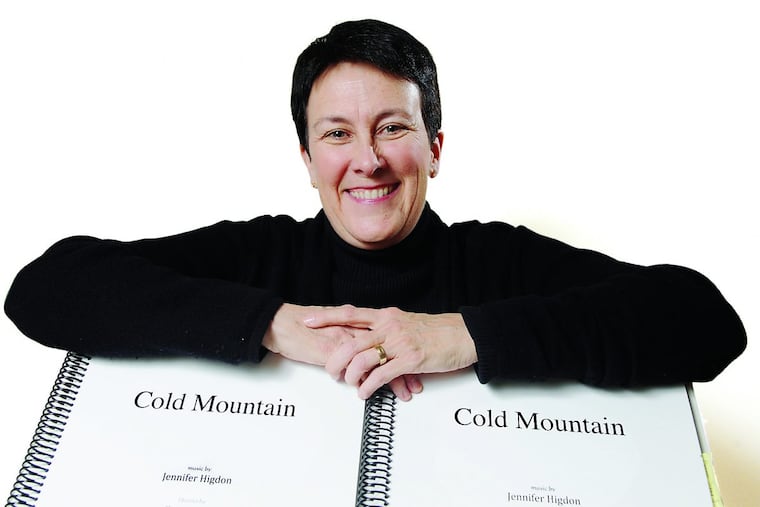Philly Grammy winner Jennifer Higdon delights Chicago with a new world premiere, coming here soon
Former Philadelphia Orchestra music director Riccardo Muti was at the podium, and in good form.

CHICAGO — After her double Grammy win in New York on Sunday for her "Viola Concerto" (and for the album that came with it), composer Jennifer Higdon barely had time to stop home in Philadelphia to pack her bags for Chicago. Amid the arctic winds of Illinois, and the composer's understandable complaints of sleep deprivation, her new Low Brass Concerto was premiered Thursday by the Chicago Symphony Orchestra.
Sight unheard, the concerto has an advanced pedigree: After the premiere Chicago performances under Riccardo Muti, the orchestra will take the piece on a tour that stops at Carnegie Hall on Friday. Then the concerto's co-commissioner, the Philadelphia Orchestra, takes up the piece Feb. 22-24 under Cristian Macelaru.
The piece itself appears to be unprecedented: Nobody has written a concerto for four low brass players and orchestra, though you're surprised the Chicagoans haven't done something like this sooner. That orchestra's brass section is legendary for its majesty. But as most concertos are written for more treble-range instruments that easily soar above the full orchestra, the first question is how, exactly, does this one work.
Answer: Like a Jennifer Higdon concerto.
Many of the familiar earmarks are in this single-movement, multi-episode work. The reflective opening moments heard in other Higdon works were translated into her version of chorale, the kind of formal, hymnlike music that shows off brass voices, both individual and collective, even among instruments like these that lack contrasting timbres. This sets the tone for the piece, partly in the way Higdon gently resists the kind of rigor one associates with a chorale.
A visual comparison might be a marching formation in which all four players are doing the same steps, though at slightly different speeds and strides, maintaining unity while asserting individuality.
So the concerto isn't exactly written for four players, but for four players acting more or less as a single entity. Mostly. Individual instruments occasionally pop out in solos or duets. Thus, the foursome has many of the lyrical and dramatic possibilities of any concerto soloist, though not the agility that one associates with, say, a violinist who leaps into the ozone during the cadenza.
The Chicago orchestra's quartet — trombonists Jay Friedman and Michael Mulcahy, bass trombonist Charles Vernon, and tuba player Gene Pokorny — all seemed game for whatever the piece asked of them, Friedman delivering some particularly poetic solo moments. The smartly wrought slam-bang ending prompted a strong audience response. In fact, there was a partial standing ovation.
But as a whole, the performance represented only the start in the performer's investigation into the piece. Muti seemed to have taken the measure of the concerto, but outside of the quartet, the orchestra seemed a bit slow on the uptake, not necessarily with Higdon's tight-knit seesawing harmonies but in the rhythmic relationships between orchestra and soloists. Though the players seemed to get everything right, the rhythms didn't really speak. Balances were bound to be tricky; your ear had to hunt for the soloists at times.
With so much fuguelike writing, the piece would benefit from a more incisive contour from the performers — the sort that's likely to emerge as the orchestra works with the score.
Other than that, the concert showed the Chicago Symphony is living up to its illustrious past under Muti, who has been music director since 2010 (he was Philadelphia Orchestra music director from 1980 to 1992). During the Thursday rehearsal, he seemed relaxed and at home, and during the concert, he revealed the orchestra at its intoxicating best during Chausson's Poeme de l'amour et de la mer.
Being the renowned opera conductor that he is, Muti had the great luck to have the emerging Clementine Margaine as his mezzo-soprano soloist. Her expressive use of the French text, mesmerizing concentration, and depth of tone was a deeply memorable combination.
Britten's "Four Sea Interludes" from Peter Grimes showed that the Chicago Symphony isn't the super-precise ensemble of decades past. It doesn't need to be and actually feels more personable when less than perfect. But in Britten, a nanosecond of hesitation lessens the impact of the music.